|
|
|
Sort Order |
|
|
|
Items / Page
|
|
|
|
|
|
|
| Srl | Item |
| 1 |
ID:
172041
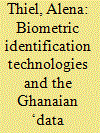

|
|
|
|
|
| Summary/Abstract |
In the global effort to strengthen national identification systems (SDG 16.9), biometric identification technologies and civil registration systems have been associated with different motives and applications, thus fuelling their competition for public attention and resources. The case of Ghana illustrates how these alternative systems, along with further sources of personal data, have recently been integrated into the larger political vision of a centralised, national population data system. Based on ethnographic fieldwork, the paper traces the difficulties and institutional negotiations that accompany this integration into a centralised population data infrastructure. Acknowledging how sets of actors, infrastructures and power relations are layered onto each other to unintended effects, the article describes the historical process of institutional and infrastructural harmonisation in the production of biometric population registers in Ghana.
|
|
|
|
|
|
|
|
|
|
|
|
|
|
|
|
| 2 |
ID:
172040


|
|
|
|
|
| Summary/Abstract |
In 2005, Cabo Verde became the second African country to receive the new foreign aid programme of the USA, the Millennium Challenge Account (MCA). It was among the few recipients of a second grant. Foreign aid has always been a controversial and hotly contested issue, and the MCA is no exception. This paper, based partly on personal experience with the programme, provides a critical examination of the nature, process and implementation of the MCA grants in Cabo Verde. The country had campaigned aggressively for the grants. The MCA not only financed important public investments, it was debt-free and without conditionalities. However, even while it allowed more leeway over its use and implementation compared with other aid programmes, it engendered its own challenges.
|
|
|
|
|
|
|
|
|
|
|
|
|
|
|
|
| 3 |
ID:
172036
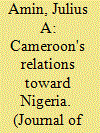

|
|
|
|
|
| Summary/Abstract |
Existing literature argues that the tactics of Cameroon foreign policy have been conservative, weak and timid. This study refutes that perspective. Based on extensive and previously unused primary sources obtained from Cameroon's Ministry of External Relations and from the nation's archives in Buea and Yaoundé, this study argues that Cameroon's foreign policy was neither timid nor makeshift. Its strategy was one of pragmatism. By examining the nation's policy toward Nigeria in the reunification of Cameroon, the Nigerian civil war, the Bakassi Peninsula crisis and Boko Haram, the study maintains that, while the nation's policy was cautious, its leaders focused on the objectives and as a result scored major victories. The study concludes by suggesting that President Paul Biya invokes the same skills he used in foreign policy to address the ongoing Anglophone problem, a problem that threatens to unravel much of what the country has accomplished.
|
|
|
|
|
|
|
|
|
|
|
|
|
|
|
|
| 4 |
ID:
172042
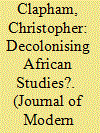

|
|
|
|
|
| Summary/Abstract |
Insistent calls to ‘decolonise’ African studies beg the question of what this quest actually involves. If it refers to an attempt to understand the continent's diverse and complex societies that builds on their indigenous structures and values, this was a task initiated during the decolonisation era of the 1950s and early 1960s. Led by historians and drawing heavily on insights from anthropology, it led to a revolution in the understanding of Africa, which nonetheless failed to maintain its impetus as a result of the political authoritarianism and economic decay of the post-independence period, which had a particularly damaging impact on Africa's universities. Of late, however, the phrase has come to refer to developments notably in North America and Europe, which in subordinating the study of Africa to agendas in the global North may appropriately be described not as decolonisation but as recolonisation. A genuine decolonisation of knowledge production for Africa must rest on a return to its roots within the continent itself.
|
|
|
|
|
|
|
|
|
|
|
|
|
|
|
|
| 5 |
ID:
172039
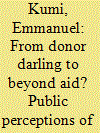

|
|
|
|
|
| Summary/Abstract |
In recent years, there has been growing interest among lower-middle income countries (LMICs) to reduce their dependence on donor resources, framed normatively as ‘beyond aid’. Yet, public perceptions about beyond aid narratives remain under-studied. This article explores current public perceptions in Ghana about the ‘Ghana Beyond Aid’ (GhBA) vision aimed at promoting structural economic transformation through the use of national resources while reducing dependence on donor aid. Drawing on 67 semi-structured interviews with government officials, civil society organisations (CSOs), donor representatives, academics, ‘ordinary citizens’ and media reviews, this article examines public understanding, rationale and perceived barriers to the implementation of the GhBA vision. I show that while GhBA is a welcome development for promoting structural economic transformation and ownership over national development priorities, mechanisms for propelling the GhBA are largely absent. Achieving GhBA will require a conscious effort by government and stakeholders to move beyond political rhetoric and partisan politics to setting out clear policy direction in addition to building a national consensus in promoting the vision. Implications of the research findings are discussed.
|
|
|
|
|
|
|
|
|
|
|
|
|
|
|
|
| 6 |
ID:
172038


|
|
|
|
|
| Summary/Abstract |
Since the cessation of conflict in 2002, Sierra Leone has experienced extraordinary levels of involvement from Western donors. Paradoxically, while relationships are often portrayed on the ground as strong with significant donor influence, our research shows considerable fluidity in individual and institutional relationships. The article disaggregates donor–government relations at various levels over a short but crucial period, 2010–16, asking in each case who occupies the driving seat. In so doing, the article interrogates the concept of ‘extraversion’, investigating to what extent government – and indeed donors – has space in which to manoeuvre and how and why government and donors act as they do in this space. The period 2010–16 is of particular interest due to extreme iron ore price volatility and the Ebola epidemic of 2014–15. The article adds much-needed critique and empirical evidence to the debate on donor influence and ‘extraversion’.
|
|
|
|
|
|
|
|
|
|
|
|
|
|
|
|
| 7 |
ID:
172037
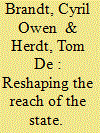

|
|
|
|
|
| Summary/Abstract |
We analyse the politics of the reform of teacher payment modalities in the Democratic Republic of Congo (DRC) in light of the uneven territorial reach of the DRC state. The reform focused on extending this reach by paying all teachers via a bank account, replacing long-standing shared governance arrangements between state and faith-based organisations with a public-private partnership. By using qualitative and quantitative data, we map the political practices accompanying the implementation of the reform. While the reform itself was officially deemed a success, its intended effects were almost completely offset in rural areas. Moreover, governance of teacher payments was not rationalised but instead became even more complex and spatially differentiated. In sum, the reform has rendered governance processes more opaque and deepened the existing unevenness in the geography of statehood.
|
|
|
|
|
|
|
|
|
|
|
|
|
|
|
|
|
|
|
|
|